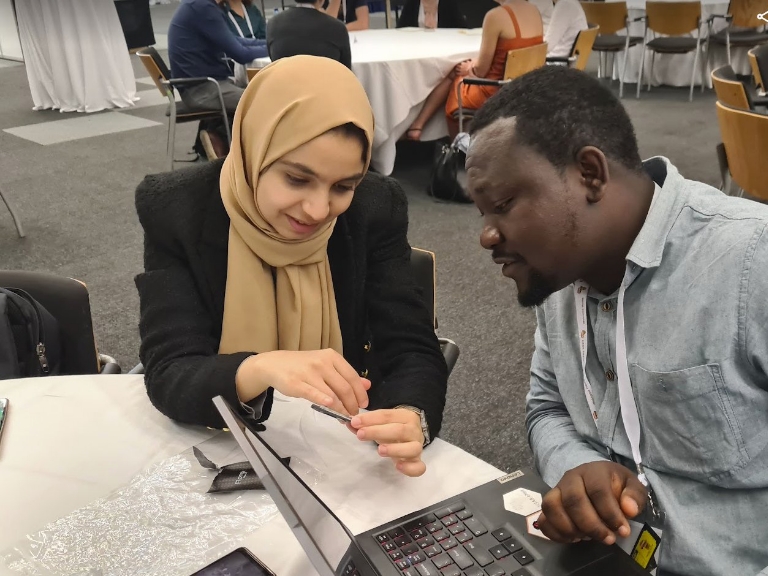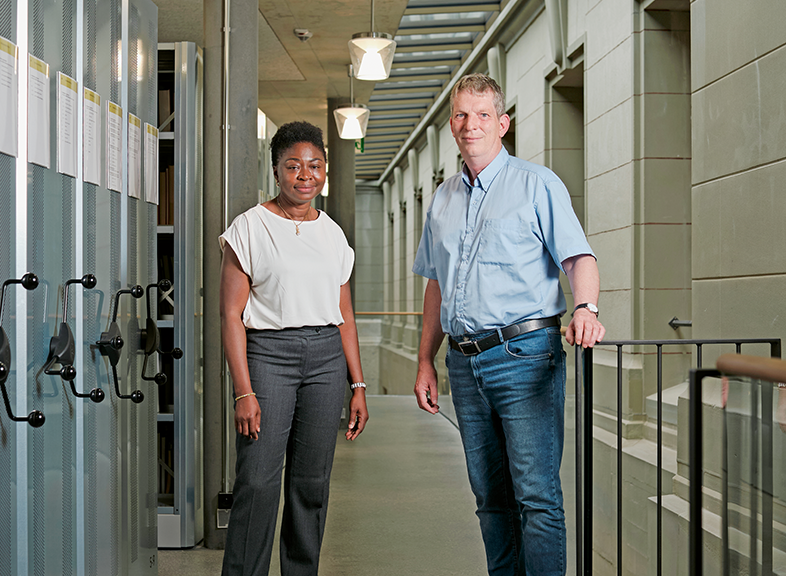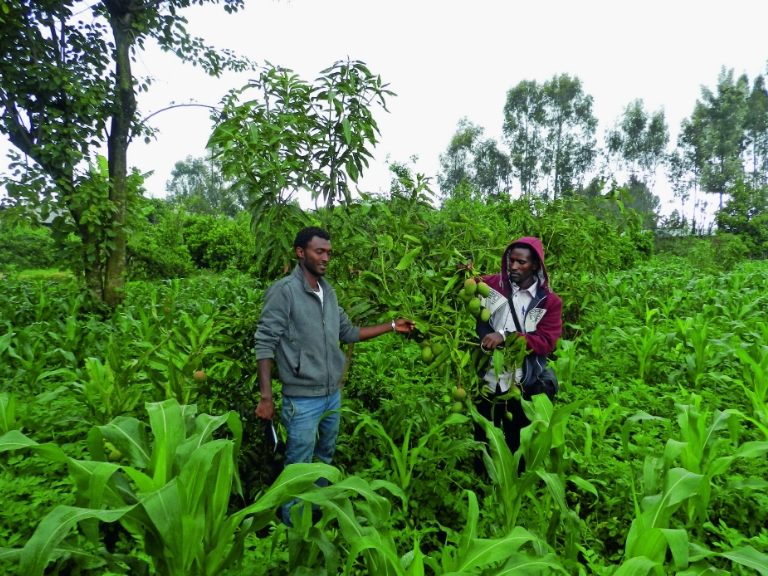Initiative Afrique
“African expertise pushes the university forward”
Professor Margaret Owuor and Vice-Rector Hugues Abriel discuss the reasons and plans behind Initiative Afrique, a new program that aims to unite existing research expertise at the University of Bern.
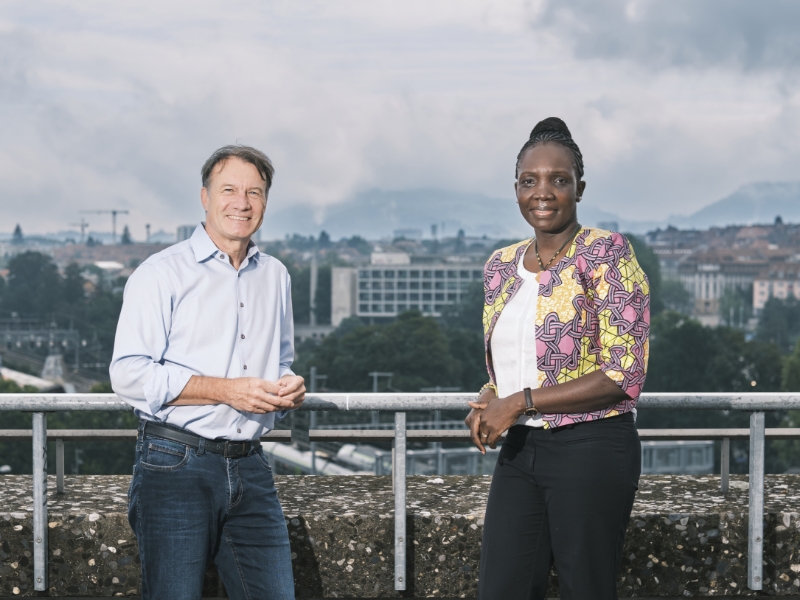
What made you both want to join the Initiative Afrique?
Margaret Owuor: When I moved here to start my professorship at the Wyss Academy and the Institute of Ecology and Evolution in 2022, I was very excited to hear about the Initiative Afrique. I thought this is going to give me a platform where I could address and discuss some of the issues I have been grappling with as an African working in an international research community. I see an opportunity to do things differently.
Hugues Abriel: I have already worked with African scientists and students for about 10 years. In my role as Vice-Rector for Research and Innovation, I proposed to the university board to have a geographic focus as part of our goal to enhance international networks within Strategy 2030. There was already a good momentum coming from the university’s membership in “The Guild of European Research-Intensive Universities” and its growing collaboration with the “African Research Universities Alliance (ARUA)”. Two of our Vice-Rectorates are now working together within the Initiative Afrique.
Why are you focusing on the African continent specifically?
Abriel: This focus is not to be understood exclusively, but there is great potential on the African continent. We are looking at some of the most crucial issues the world is facing today: climate change, water and land management, migration and much more. At the same time, we have a fascinating research environment that ranges from biodiversity to genomics. For example, the history of the human population started in Africa, so the genomes there are much more diverse and carry huge potential for medical research. However, in this research, you cannot ask the right questions if you are not working with the people who are directly impacted.
Owuor: As a researcher, of course I have to highlight the biodiversity hotspots as well. More broadly however, forecasts estimate that in a couple of decades, at least a third of the world’s youth will be African. These people are very talented and excited about new technologies. For example, Africa is one of the leading adopters of the use of cell phones. You will find a cell phone in the most remote part of of Kenya. Along with that, mobile payment service has been established as early as the 2000s.
Abriel: These technologies, and I want to add artificial intelligence as well, are much more accessible than expensive research equipment. All you need is a smart brain – and this is where plenty of well-educated young students come in, eager to show that they can contribute globally.
Owuor: Africa also has a huge group of very accomplished scientists, but they don't have the same opportunities. African countries spend an average of less than 1% of their GDP on research, because research is too often viewed as an expense and not a necessity. But if you don't have funding, it is difficult to design research and remain competitive in your field of expertise. Most researchers end up using their own salary. When I worked in Kenya, I had to buy my own work laptop. Then you need funds to access and publish in journals, do field work and attend conferences to share your research. If you want to get involved internationally, you also need visas and travel grants.
Is funding an issue the Initiative Afrique wants to address?
Abriel: Funding is obviously an important aspect, but do we really need to call for a big investment from the University board? I think that a lot of things can be done with little money – maybe that’s something we can learn from our African colleagues.
Owuor: I also think it is best to start small and then see how to scale up. I would like to see a concept that has different options to cater for the needs of students and researchers, such as short stay exchange programs with the same opportunities and benefits as those in Western Countries. Not everyone is able to travel for longer duration stay in Europe due to family and work engagements. In the end, we aim to train and empower more people within the African continent.
Abriel: We have an opportunity here to do better than in the past, when we had the resources to fly into a place, collect data, and return without proper inclusion of local colleagues. This understandably generated a lot of frustration. Our colleagues like Margaret, coming from the continent, have their history, their networks and their visions of how to develop collaboration and science. And we should clearly listen to them and prioritize our activities accordingly.
How are you working together within the Initiative Afrique?
Abriel: We have built a community that will also be represented by a board, ideally involving all faculties. We want to keep the community as broad and inclusive as possible as long it has to do with African projects, partners and people. Anyone at the university, even pre-grad students, is more than welcome – the younger, the better!
So it is not only about networking across borders, but also connecting people within the university?
Owuor: Very much so. The main goal is to share our knowledge and experience, so we can improve projects and practices across disciplines. We have researchers and institutions at the University of Bern that have established long-term partnerships on the continent, for example with the Universities of Addis Ababa and Nairobi. Then we also have a good number of researchers with African roots here in Bern. But being a minority, even as a professor, there is still fear about whether you really hold a voice. Some of my colleagues work in settings where “Africa” is unfortunately just an empty word in the title of the project or the institution, instead of being a real part of it. Luckily here in Bern, we have the Initiative Afrique providing a space for all sides to get involved.
Abriel: I think this is the only way to set up for success. This community approach takes more time at the start as we find out how to best work together, but it makes our efforts stronger and less likely to fizzle out over the next years as people come and go.
Looking five years into the future, what would you like to achieve by then?
Abriel: One of the potentials of our comprehensive university lies in multi- and transdisciplinarity. I would really like to see biologists talk to linguists and compare their approaches when collaborating with African colleagues – maybe even work on projects together? I think the journey is the destination here.
Owuor: For me, the vision is very simple. It's about achieving more inclusivity and about changing things for the better.
Learn more about the Initiative Afrique
https://www.unibe.ch/initiative_afrique/index_eng.html
Contacts: Prof. Dr. Margaret Owuor: margaret.owuor@wyssacademy.org, Prof. Dr. Hugues Abriel: hugues.abriel@unibe.ch
Collegium generale
On September 25, 2024, Prof. Dr. Ernest Aryeetey, former Secretary General of the African Research Universities Alliance (ARUA), will speak at the University of Bern as part of the Collegium generale lecture series. More information: collegiumgenerale.unibe.ch
Learn more: collegiumgenerale.unibe.ch
About the person
Margaret Owuor
is a Professor at the Wyss Academy for Nature and the University of Bern. Her research focuses on nature's benefits to people and biodiversity conservation. She has adopted a strongly local participatory approach in her research and enjoys working with young people through teaching and mentorship.
About the person
Hugues Abriel
is Vice-Rector for Research and Innovation and a Professor at the Institute of Biochemistry and Molecular Medicine at the University of Bern. For several years he has been in close contact with young doctors and researchers from French-speaking regions of Africa and has spent an academic sabbatical at the Universities of Kinshasa (Democratic Republic of Congo) and Fez (Morocco).
Magazine uniFOKUS
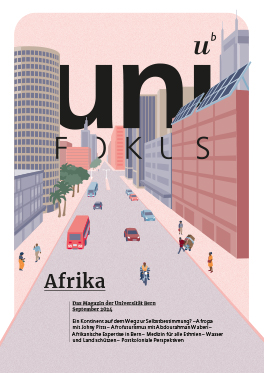
Africa
This article first appeared in uniFOKUS, the University of Bern print magazine. Four times a year, uniFOKUS focuses on one specialist area from different points of view. Current focus topic: Africa
Subscribe to uniFOKUS magazineSubscribe to the uniAKTUELL newsletter

Discover stories about the research at the University of Bern and the people behind it.
